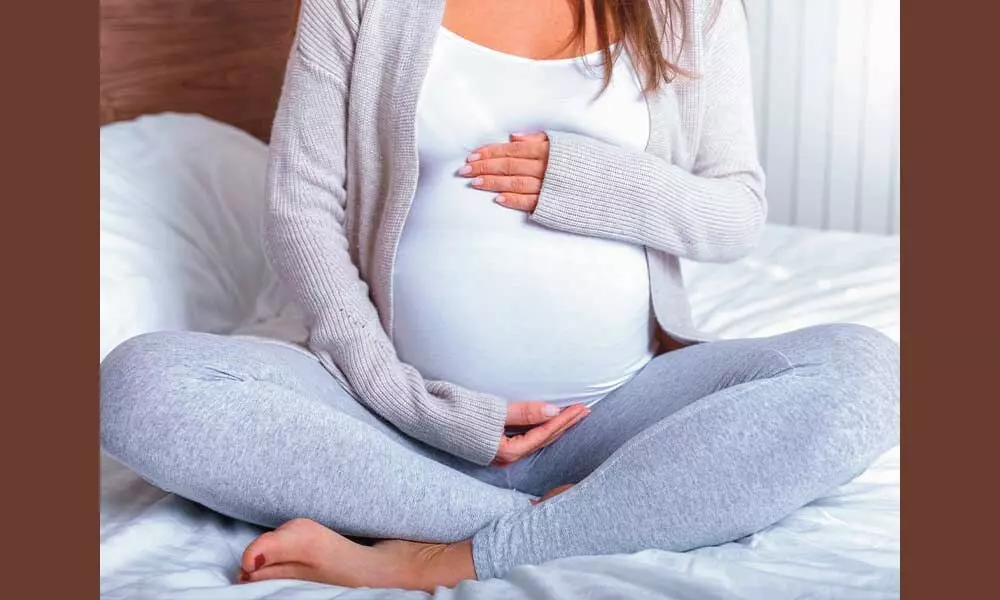Live
- Carden Search in Nagar Kurnool District
- Rukhsar Dhillon’s sultry look sets social media abuzz
- YS Jagan to kick-start second phase election campaign
- Telangana Education Department Set to Release Class 10 Exam Results on April 30
- Crafting stories from Mumbai to literary acclaim
- Gold rates in Delhi surges, check the rates on 28 April 2024
- Gold rates in Vijayawada surges, check the rates on 28 April 2024
- Gold rates in Hyderabad surges, check the rates on 28 April 2024
- Gold rates in Visakhapatnam surges, check the rates on 28 April 2024
- Shri Sarathi Studios with advanced technology
Just In
Covid positive pregnant women at 3 times greater risk of premature delivery: Warn doctors


Covid positive pregnant women at 3 times greater risk of premature delivery
In later stages of pregnancy, women are at an increased risk of becoming seriously unwell with Covid-19 and are three times more likely to have a premature baby which can affect their long-term health, said Dr Vidya V Bhat, Fertility Specialist & Medical Director, Radha Krishna Multispecialty Hospital. She was speaking ahead of the Safe Motherhood Day.
Bengaluru: In later stages of pregnancy, women are at an increased risk of becoming seriously unwell with Covid-19 and are three times more likely to have a premature baby which can affect their long-term health, said Dr Vidya V Bhat, Fertility Specialist & Medical Director, Radha Krishna Multispecialty Hospital. She was speaking ahead of the Safe Motherhood Day.
"Two-thirds of women who test positive for Covid-19 in pregnancy show no symptoms at all. However, some pregnant women can get life-threatening illness from Covid-19 if they have an underlying health condition like diabetes, immune problems, high blood pressure, heart disease or asthma. The risk of fetal distress, pre-term delivery and pre-labour rupture of membranes rises with the onset of Covid-19 in the third trimester (over 28 weeks) of pregnancy. The risk from Covid is also greater if pregnant women are overweight or above the age of 35," Bhat said.
She added that the benefits of breastfeeding the infant by Covid-positive mothers far outweigh the risk of transmission of coronavirus through breastmilk. "The main risk of breastfeeding is due to the close contact between Covid-positive mother and the baby, which can pose a risk of droplet infection that can spread to the baby while breathing. The presence of IgA antibodies in breast milk protects breastfeeding infants against infection and death," Bhat pointed.
Addressing the issue of vaccine hesitancy among pregnant women, she explained that Covid-19 vaccines would work whatever the stage of pregnancy.
"Covid-19 vaccines do not contain ingredients that are known to be harmful to pregnant women or to a developing baby. However, as Covid-19 has more serious complications in later pregnancy, some women may choose to delay their vaccine until after the first 12 weeks, which are most important for the baby's development, and plan to have the first dose at any time from 13 weeks onwards," Bhat offered her insight.
Women aged below 22 years and above 35 years of age are at the most risk of adverse pregnancy outcomes. Anemia, obesity, gestational diabetes, pregnancy-induced hypertension, cardiac diseases and auto-immune disorders are the main risk factors for adverse pregnancy outcomes. "While thyroid, obesity and gestational diabetes are common risk factors for women of upper socio-economic strata, those from the other end of the spectrum face risks posed by anemia and pregnancy-induced hypertension," the doctor said. "We have witnessed a steep rise in maternal deaths during the COVID-19 pandemic. This crisis has shown us that we must strengthen health systems to cope with emergencies without impacting essential services," said Poonam Muttreja, Executive Director, Population Foundation of India. National Safe Motherhood day is celebrated on 11 April every year, on Kasturba Gandhi's birth anniversary. This year, the focus must be on ensuring access to quality family planning services and reproductive health services for all.
"Maternal morbidity – or the long-term illness associated with pregnancy and childbirth – is also a critical but neglected area which needs focus, as it has physical, mental, social and economic consequences for women. This affects their children's health as well, resulting in inter-generational consequences. "The focus of safe motherhood needs to be widened to include morbidity as an important aspect of maternal health," Muttreja added.

© 2024 Hyderabad Media House Limited/The Hans India. All rights reserved. Powered by hocalwire.com






